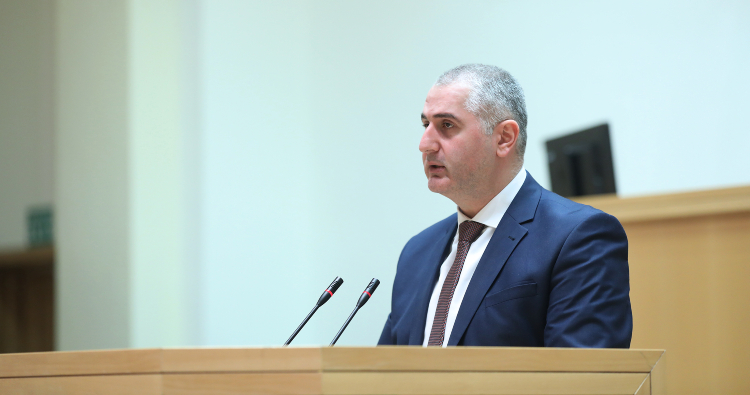Finance Minister highlights legal harmonisation with EU, tax transparency in report to Parliament

Khutsishvili highlighted the agreement on Georgia's participation in the tax and customs programme for 2022-2027 last year, with the deal strengthening cooperation between the EU and the country in the area. Photo via Ministry of Finance
Georgian Finance Minister Lasha Khutsishvili on Thursday told the country’s Parliament financial authorities were working on harmonising the domestic legislation with the European Union and ensuring tax transparency through international agreements.
In his report on the Ministry’s work to lawmakers, Khutsishvili highlighted ongoing and implemented reforms in management of state finances, investments and debt, reform of state enterprises, study of the effectiveness of tax expenditures and reforms in tax and customs structures.
The Minister “active work” was ongoing to ensure a “high degree of harmonisation” with European Union legislation, noting changes made to the tax and customs legislation in order to meet EU standards based on the 2014-signed Association Agreement.
Georgian authorities are also fulfilling obligations to international organisations in international taxation, he pointed out, mentioning the November signing of the Organisation for Economic Co-operation and Development’s Multilateral Competent Authority Agreement on Automatic Exchange of Financial Account Information.
The signing serves the goal of improving tax transparency and legal compliance and enabling domestic structures to automatically exchange financial information with their counterparts of states participating in the agreement starting next year.
Khutsishvili also highlighted the agreement on Georgia's participation in the tax and customs programme for 2022-2027 last year, with the deal strengthening cooperation between the EU and the country in the area.
It also aims to support implementation of tax policy and EU tax legislation, promote cooperation between competent authorities, exchange information and development of administrative capacity, as well as include the development and operation of human resources and electronic systems.
The Minister also told MPs the infohub.rs.ge online platform served to present information and documentation to taxpayers after its launch by the Revenue Service with the support of the United States Agency for International Development and the European Bank for Reconstruction and Development.
The Revenue Service has started automating customs processes using artificial intelligence and robotics technology, he also revealed in his comments, noting the first Digital Customs Officer service was operational and working on receiving documents uploaded by users, digitising papers, informing users about potential errors in their forms and printing declarations.
 Tweet
Tweet  Share
Share